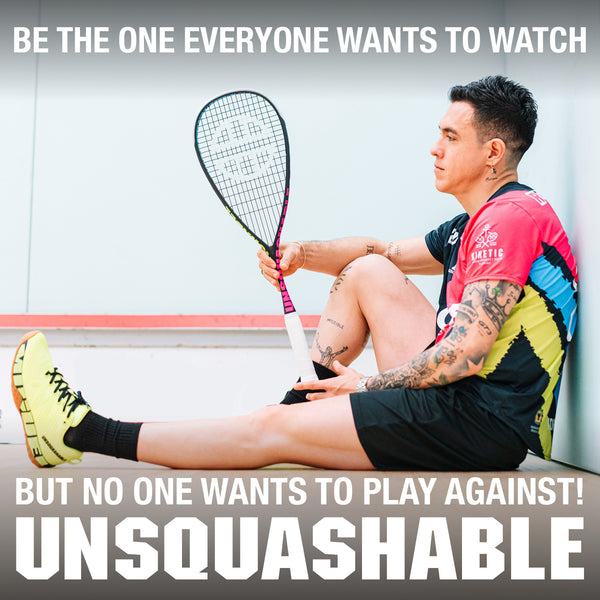Olympic Games inclusion is testament to the growing appeal of squash
April 15 2025

World Squash, alongside US Squash, and the Professional Squash Association (PSA) have officially confirmed that the Universal Studios Lot in Los Angeles, California, will serve as the venue for squash’s historic debut at the Olympic Games Los Angeles 2028 (LA28).
The global squash community, from grassroots players to elite professionals, have welcomed this landmark moment with pride, celebrating the sport’s inclusion on the Olympic stage. With a commitment to unity, excellence, and fair play, the squash world looks ahead with great anticipation to the 2028 Games in Los Angeles.
Further details regarding the squash competition schedule at LA28 are expected to be released by the organising committee in the coming months.
In a historic turn of events, the sport of squash has joined the Olympic Games family. The 16th October 2023 will go down as a pivotal date in squash history, marking not only an occasion of global recognition for the sport but also presenting a opportunity for the sport's resurgence. The memories of the 2005 IOC meeting in Singapore, where Olympic inclusion seemed tantalisingly close, have now found their place in the annals of history and a new chapter is poised to redefine squash's narrative on the global stage.
This milestone isn't the exclusive domain of professional players; it's a collective triumph for the entire squash community around the world. Every squash player has played a vital role in the journey of the sport, and the relentless efforts of the World Squash Federation (WSF), Professional Squash Association (PSA) and US Squash have proven their worth. Despite occasional unfounded and ill-informed criticism from certain quarters, these organisations have remained unwavering champions of our sport's global advocacy.
The addition of squash to the Olympic roster is further complemented by Mark Walter's strategic investment in Squash Media & Marketing (SMM), the commercial organisation of the PSA. This isn't merely an infusion of capital; it represents a vote of confidence, a driving force that will unlock fresh commercial horizons and raise the sport's profile. The PSA is now poised to elevate the global perception of squash, showcasing the athleticism, skill, and competitive spirit that define the sport of squash.
While the spotlight naturally falls on our elite professional squash players, we must not neglect the grassroots. The narrative of decline, characterised by decreasing participation and court closures, can be reversed. Olympic inclusion and increased funding for national federations can serve as catalysts for a renaissance. The emergence of sports like pickleball and padel tennis underscores the evolving landscape of racket sports. Yet, squash's Olympic status raises its stature, offering a compelling narrative of resurgence and relevance.
The recent announcement of Peter Nicol's combined squash and pickleball centre in New Jersey, USA which is set for 2024, signifies the synergies that can be harnessed. This is not a zero-sum game; squash, pickleball, and padel tennis can coexist, enriching the ecosystem of racket sports and sports clubs. Olympic inclusion is a testament to squash's enduring appeal and its capacity to adapt, evolve, and thrive.
The five years leading up to the LA 2028 Olympic Games are pivotal for squash. This is a time for celebration, but more importantly, a time for action, innovation and global collaboration. The grassroots level of the sport needs a boost and initiatives like the "right ball" campaign and the broader acceptance of racketball are positive steps. Outdoor squash courts and potential modifications to the entry-level experience are required. We should embrace the simplicity and joy of merely hitting a ball against a wall, any wall.
We must also adapt to the demands of contemporary life, offering flexible and accessible ways for people to engage with competitive squash. Each one of us, whether player, supporter, club, national federation, or digital service provider, has a role in the transformation of squash. We are not passive observers; we are active contributors to the new chapter in the history of squash. Olympic inclusion and strategic investments serve as starting points, propelling us toward a future where squash is not merely rekindled but flourishes and garners global recognition. We are turning the page on the narrative of decline; what lies ahead is a story of resurgence and worldwide acclaim. Now is the time to act, ensuring that squash's promising future becomes a tangible reality.
The World Squash Federation (WSF), in conjunction with US Squash and the Professional Squash Association (PSA), have welcomed the official decision by the International Olympic Committee (IOC) to include squash in the sports program of the LA28 Olympic Games.
In unison, the WSF, US Squash and the PSA have expressed their deep appreciation to both the Organising Committee of the LA28 Olympic Games and the IOC for acknowledging the intrinsic value that squash brings to the Olympic stage.
The inclusion of squash in the LA28 Olympic Games represents a significant stride in fulfilling the IOC and LA28's shared mission to deliver an unparalleled sporting experience for athletes, enthusiasts, and the broader sports community. Beyond its competitive element, squash's presence will engender a positive and enduring impact within the Los Angeles community. This will translate to greater access and opportunities for local youth to partake in and compete in the sport for generations to come.
This historic verdict bestows upon squash's world-class athletes the ultimate platform to showcase their prowess on the grandest sporting stage worldwide. The sport will feature two coveted medal events: the men's and women's singles competitions.
Further particulars regarding the sporting schedule for the LA28 Olympic Games will be disclosed by the LA28 Organising Committee. The squash fraternity, spanning both the United States and the global arena, embraces the Olympic ideals of unity, sportsmanship, and excellence. It eagerly anticipates the forthcoming LA28 Olympic Games, where squash's presence will undoubtedly enhance the spectacle and resonate deeply with enthusiasts and athletes alike.
The announcement that squash has been recommended for inclusion in the 2028 Summer Olympic Games by the LA28 Organising Committee has been met with enthusiasm and anticipation by key stakeholders in the sport. The World Squash Federation (WSF), US Squash, and the Professional Squash Association (PSA) have all expressed their support for this decision, recognising its historic significance as the sport inches closer to its inaugural Olympic appearance.
This pivotal development marks a significant milestone in squash's journey towards Olympic recognition. The sport's global community is now set to embark on the next phase of collaboration with LA28 and the International Olympic Committee (IOC). The ultimate verdict on the inclusion of new sports in the 2028 Olympic program will be delivered during the IOC Session in Mumbai on October 16th, adding further suspense and importance to this momentous occasion.
As we await the outcome of the IOC's decision, the squash fraternity remains steadfast in its commitment to showcasing the sport's excellence on the world's most prestigious sporting stage. This recommendation by the LA28 Organising Committee is not only a testament to the sport's growing appeal but also a reflection of the dedication and hard work put forth by those who have tirelessly championed squash's cause on a global scale.
The squash community eagerly anticipates the final decision of the IOC scheduled for the 16th October.
For the full statement, visit LA28
The sport of squash appears poised to end its long-standing quest for inclusion in the Olympics, as Los Angeles 2028 presents a bold new line-up of five sports for potential addition to the Olympic Games program. Squash has been among the nine sports vying for approval from the LA organising committee and the International Olympic Committee (IOC). The final verdict is expected to be delivered during the IOC session in Mumbai on the 16th October, with approval all but assured.
Cricket, flag football, baseball, and softball were previously seen as strong contenders for inclusion in the 2028 Olympics. However, squash and lacrosse, with its roots in the United States, have recently emerged as potential candidates.
Casey Wasserman, the chair of LA28, highlighted the uniqueness and relevance of the proposed sports, emphasising their community-based nature and appeal to diverse fan bases. The objective is to introduce new athletes to the Olympic Games, engage various audiences, and expand the Olympics' digital presence, aligning with LA28's mission to provide an exceptional experience.
Notably, the fate of squash's Olympic bid seemed to hinge on new media investments and the connections of influential figures like Mark Walter, who owns the LA Dodgers. The cost-effectiveness and environmentally friendly nature of the sport of squash have also worked in its favour, as the sport can be played at existing venues.
Kathy Carter, CEO of LA28, stressed their commitment to fiscal responsibility and the need to challenge the status quo in shaping the Olympic Games sports program. The result is a proposal that combines cultural relevance and limitless potential.
However, the mention of squash and lacrosse raises questions about the IOC's athlete cap, which stands at 10,500. This could lead to the reduction of medal events in existing sports.
The exact structure of the squash program, should it be approved, remains uncertain. It is unclear whether it would include both singles and doubles events or adopt a best-of-three format.
The World Squash Federation (WSF), US Squash, and the Professional Squash Association (PSA) welcomed the recommendation of squash for inclusion in the LA2028 Olympic sports program, viewing it as a significant milestone in the sport's history. They expressed their commitment to collaborating with LA28 and the IOC throughout the subsequent stages of the process and eagerly await the IOC Session's decision in Mumbai on October 16th.
Squash faces competition from motorsport, cricket, karate, baseball, softball, lacrosse, breaking, kickboxing, and American football. These shortlisted sports had to meet specific criteria outlined by LA28 and the IOC, covering areas such as environmental sustainability, universality, gender equality, integrity, popularity, athlete safety, and cost considerations.
Cricket has been a frontrunner for inclusion in the 2028 Olympics, especially since IOC President Thomas Bach expressed his support in a recent interview. The International Cricket Council (ICC) has proposed a six-team event for both men and women. While an initial announcement was expected earlier, the decision was postponed by the IOC, with negotiations ongoing for several months.







